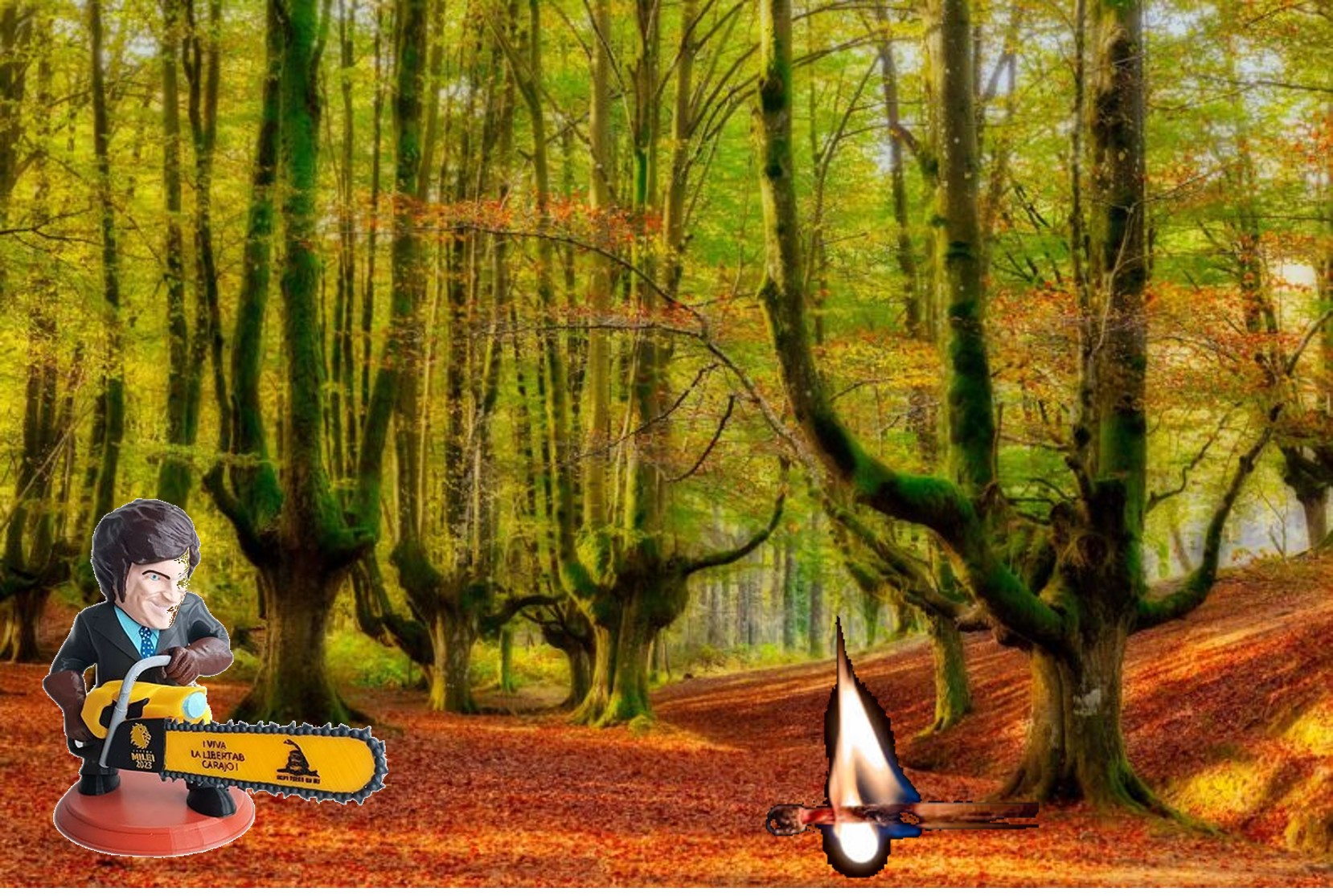After the coronavirus, on the road to the new normality of degrowth
It seems that behind the coronavirus pandemic there is a loss of biodiversity in many areas of the world. Whole ecosystems disappear to accommodate the crops and companies that the capitalist system needs. In the absence of plant and animal diversity, diseases affecting wildlife facilitate the leap to other animals and hence to the main human species on the planet. It also contributes to the increase in the size of livestock holdings, the high livestock densities of these farms and the industrial uses of their health, impregnated with antibiotics and other chemicals.
In addition, this ease of passage from diseases to human beings has been reinforced by another characteristic of our civilisation: hypermobility. Globalisation has allowed the disease to occupy the entire planet in a few weeks thanks to the power of fossil fuels that displace the transport of people and goods over long distances in aircraft and ships. We have created a society so interconnected and interdependent that any small problem, at any point, is transmitted to others and is rapidly amplified.
All of them are symptoms of a series of chained crises that humanity is currently experiencing. They are a reflection of a system that has been increasing the level of exploitation of nature and people. A capitalist system, based on the unbridled extraction of natural resources, which needs continuous growth (impossible on a limited planet) and is reaching the limits of extractable resources and sinks of waste generated.
So, on the one hand, we have to deal with the depletion of fossil fuels, which account for about 80% of the energy we consume today. At this time, extraction can hardly be increased, as it is necessary to maintain the "growth" of this capitalist system.
Moreover, the development of renewables is not being the expected due in large part to the constraints they face. These are installations that occupy part of the energy flows of nature and that should be consumed practically at the time of its capture, being difficult to store. It is the energy produced mainly in the form of electricity, which accounts for approximately 20% of the energy we consume today. And electricity storage isn't very cost-effective and difficult: the main system would be batteries, but there are other compressed air systems that use hydrogen. Finally, it should be noted that renewables are not produced continuously, but are stationary, which further increases the need for storage.
The problem of resource depletion does not end with energy, but many other raw materials and minerals are depleted: the phosphorus needed for chemical fertilisers, the copper needed to transmit electricity, all metals grouped under the name of rare earths, which are widely used in informatics and in new renewable energies.
"The only solution is to change the system. Technological solutions are not to deal with all of this."
To this must be added the exhaustion suffered by the warehouses where we store the waste products we generate in the consumption of all the above. The main example is Climate Change, produced by the increase in CO2 and other greenhouse gases that we emit into the atmosphere as residual elements of the combustion of fossil fuels, as well as in other processes generated by our consumerism. But what's more, they're landfills of all kinds of urban or industrial waste, incinerators burning this waste, generating carcinogenic compounds and other air pollutants, or solid waste like ash and slag that needs hazardous waste landfills.
All these problems that we face have a common origin, our predation about nature and people. And the only solution is to change the system. Technological solutions are not able to deal with all of this, due to the limitations imposed by physics. The laws of thermodynamics indicate that "you can't get out of where you're not": energy can only be transformed and always does it for less availability, there are always losses, and raw materials can't be reused under the same conditions if it's not a big energy consumption to recycle.
In this way, only solutions based on social change will be truly effective. Solutions to reduce the total consumption of raw materials and energy and try to close the harvesting cycles. And the reduction of consumption and the simplification of the social system will be "yes or yes". It is essential because the resources mentioned are becoming more and more depleted.
"It could be said that there are two scenarios for the future: that the reduction of consumption affects everyone equally or only part of the population"
In this situation, it could be said that there are two scenarios of the future that we can express in a simplified way: that the reduction of consumption affects everyone equally or only a part of the population. The latter would be a setback in social expropriation, a process that, once again, would only benefit the privileged classes of the enriched countries and which would involve dictatorial regimes but supposedly protected at the planetary borders. [Echo-axism].
We believe, however, that it is possible to ensure that the process of reducing consumption is equitable for the whole of society. To achieve an adequate life for humanity and the planet, both in our enriched and impoverished countries. We call this alternative Desgrowth. And we believe that we have to do everything we can to make that the path of humanity.
Our world is moving towards a situation in which the least energy will reduce global trade and tourism, which will force productive activities to be relocated. Production will be gradually simplified, using less energy and less technological resources. Much of the work will also have to be based on local resources and directed towards the primary sector (agriculture, livestock, forestry, fishing...) to meet the essential needs of the population. And the basic maintenance of the renewable energy infrastructure, the rehabilitation of buildings, waste management, small local industry and ecological restoration will also be essential.
All these processes will require a radical change in the productive fabric and a new structure. This structure will be positive for the staff if we manage to have Desgrowth planned, distributed and equitable. Minimise the law to achieve maximum private performance. Share work among the entire population, regardless of gender and social classes, both production, reproduction, production of consumer goods and care of children and the elderly.
That is why we need to begin to show the possibilities of this new world that is coming upon us in order to expand its difficulties and possibilities. How beautiful a simpler, more local society with more social relationships can be. And also the challenge of making a current hyper-consumer society necessary to a humble society.
Bidali zure iritzi artikuluak iritzia@argia.eus helbide elektronikora
ARGIAk ez du zertan bat etorri artikuluen edukiarekin. Idatzien gehienezko luzera 4.500 karakterekoa da (espazioak barne). Idazkera aldetik gutxieneko zuzentasun bat beharrezkoa da: batetik, ARGIAk ezin du hartu zuzenketa sakona egiteko lanik; bestetik, egitekotan edukia nahi gabe aldatzeko arriskua dago. ARGIAk azaleko zuzenketak edo moldaketak egingo dizkie artikuluei, behar izanez gero.
You may not know who Donald Berwick is, or why I mention him in the title of the article. The same is true, it is evident, for most of those who are participating in the current Health Pact. They don’t know what Berwick’s Triple Objective is, much less the Quadruple... [+]
The article La motosierra puede ser tentadora, written in recent days by the lawyer Larraitz Ugarte, has played an important role in a wide sector. It puts on the table some common situations within the public administration, including inefficiency, lack of responsibility and... [+]
Is it important to use a language correctly? To what extent is it so necessary to master grammar or to have a broad vocabulary? I’ve always heard the importance of language, but after thinking about it, I came to a conclusion. Thinking often involves this; reaching some... [+]
The other day I went to a place I hadn’t visited in a long time and I liked it so much. While I was there, I felt at ease and thought: this is my favorite place. Amulet, amulet, amulet; the word turns and turns on the way home. Curiosity led me to look for it in Elhuyar and it... [+]
Adolescents and young people, throughout their academic career, will receive guidance on everything and the profession for studies that will help them more than once. They should be offered guidance, as they are often full of doubts whenever they need to make important... [+]
It will be two or three weeks since I read it, in a column by Maialen Akizu. Aner Peritz brought with him what he said on TV: “Bertsolarismo is what has led me not to interact with zis hetero men, because bertsolarismo is what has made me dissident, and also because... [+]
If that's the fear. Donald Trump seems to have come to occupy Washington’s rounded office for a long time. He has a second mandate, but to his close advisers, confirming that he is not joking, he also mentions his rigid goal of changing some isolated numbers in the Constitution... [+]
Ansorena´tar Joseba Eneko.
Edonori orto zer den galdetuz gero, goizaldea erantzungo, D´Artagnanen mosketero laguna edo ipurtzuloa, agian. Baina orto- aurrizkiak zuzen adierazten du eta maiz erabiltzen dugu: ortodoxia, ortopedia, ortodontzia... Orduan (datorrena... [+]
“Bag of resilience”, “survival manual”, “backpack of evacuations”: that’s what you can hear in the mouths of the authorities in recent weeks.
Among the declarations of the past month, the European Union has asked the population to prepare a “survival kit” to... [+]
It’s not Christmas Day, it’s Christmas Day that we Basques need. Once a year there are repeated calls from potential patriotic parties and groups, on these dates, the homeland of the Basque Country is the Basque Country/Euskal Herria around the proclamation. It's a matter of a... [+]
Last week I had a nice meeting with a group of women that I hadn’t seen for a long time, and we talked about doing it, linked to spaces of technology and creation.
The oldest of these women, who is on the frontier of retirement, is a programmer and enjoys programming code... [+]
Hainbatetan esan izan didate arkitektoen lanaren gauzarik indartsuena dela ekoizten duguna betikotu egiten dela. Eraikinaren betikotasunak gizakiaren presentzia tenporala gainditzen duela eta geroko etorkizunean iraunkor egingo gaituela. Eta liburu batekin gertatzen ez den... [+]
Many Basque feminists have been disappointed to learn that writer Chimamanda Ngozi Adichie has externalized pregnancy, meaning that a surrogate has fertilized her baby for money.Adichie is the author of the essay We should all be feminists, among others. They have ignored the... [+]


















